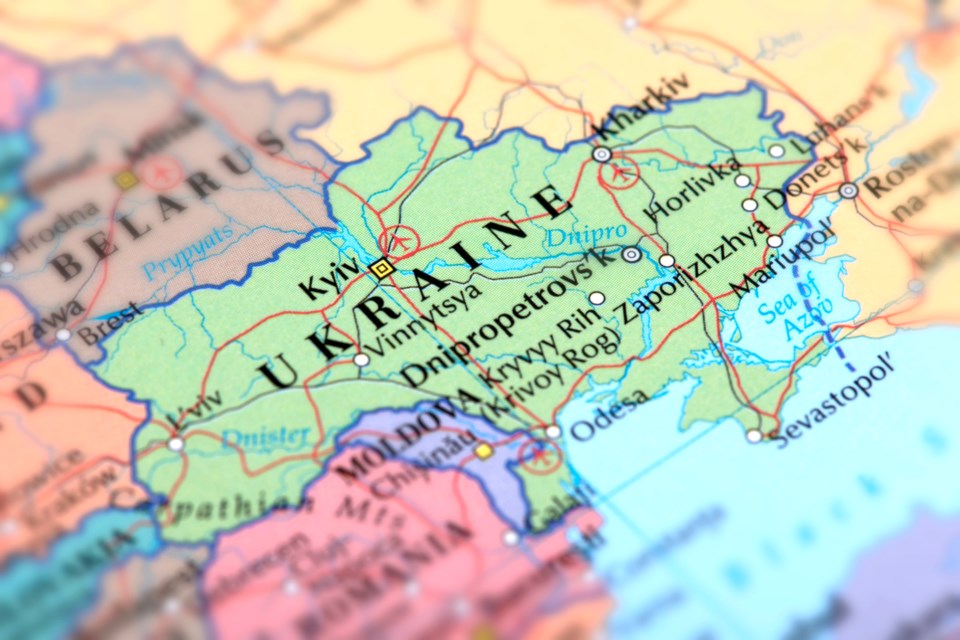Peter Bihun takes a moment to compose himself before he speaks about his cousin in Ukraine.
“We got an email this morning from one of our cousins and they said they're very scared right now,” Bihun said, holding back tears. “There's bombing in their area, and they're terrified."
“They can see the aircraft coming in, the bombers and so on, and the missiles are going over top of them.”
Bihun is the president of Kelowna's Dolyna Ukrainian Cultural Society – an organization that helps maintain a strong sense of community among the roughly 14,000 Ukrainian-Canadians in the Central Okanagan.
Bihun's first reaction was shock when he learned of Russia's invasion into Ukraine late Wednesday night. Next, he felt anger.
“Can you imagine here in Kelowna, tanks are running down Harvey Avenue, it's almost unbelievable. And that's what they're facing right now,” Bihun said.
But while the invasion shocked him, he notes it's a continuation of Russian President Vladimir Putin's annexation of Ukraine's Crimean Peninsula in 2014.
“This isn't just a new invasion, this is a continuation of an invasion,” Bihun said. “The Western World should have got on top of this ... when he invaded, that's when the big sanctions should have hit and they would have stopped all of it. But they didn't. So he's continuing on. So now we have a new Hitler. And so how far this Hitler will go, I don't know. Ukraine definitely won't be the last stop for him if he wins here.”
But Bihun, who visited Ukraine annually before the pandemic, says the Ukrainian people will not give up without a fight.
“After [Russia] invaded Crimea and eastern Ukraine, we said, 'Well, what do you do? What if they continue on? What if they come here, what would you do?'” Bihun said.
“And they said, 'We will stand and fight to the last person.' They said 'We are not giving up our land. This is our land. This is our democracy. And we fought many, many long hard years for it and we're not giving it up.'”
As the Soviet Union collapsed in the late 1980s and early 90s, Ukraine gained its independence from the USSR in 1990. Having a relatively short-lived democracy compared to Canada, Bihun says the Ukrainian people have every reason to fight back against Russia.
“They know what it's like to live under a dictatorship, most of us here just have no appreciation of how horrible that is ... But there, all their grandparents lived through that and told them about that and these people will not go back to that," Bihun said.
“So they are going to fight and they're going to fight hard and I hope they bloody the nose of enough of those guys that they decide maybe it's better just to take their troops and go home.”
Bihun's cousin lives near Lviv, an old city with cobblestone streets and centuries-old buildings, near the border with Poland. But Bihun says his cousin has no plans to flee to the west; “He's going to stay, he's going to fight.”
While Bihun was born in Prince George, he says he would be heading to Ukraine to help fight too if he was a younger man. Instead, he's doing what he can to help from the other side of the world.
Bihun urges Canadians to write their local MPs, to urge the Canadian government “get serious about sanctions.” Additionally, he directed Canadians to the Canada-Ukraine Foundation and Ukrainian Canadian Congress' humanitarian aid fundraiser, which has raised more than $215,000 since late January.
“There's going to be a lot of people on the run there. They're running from bomb explosions, so they don't have a lot,” Bihun said.
“They are going to be refugees. And countries like Poland have said they'll take a million people. The Czech Republic said they'll take a million people, but even for Poland to handle that, they're going to need help. That's a lot of people to feed and keep warm and all the rest of it.”
The Canada-Ukraine Foundation is a registered charity, and it has guaranteed that 95% of all donations will go directly to humanitarian aid in Ukraine.




